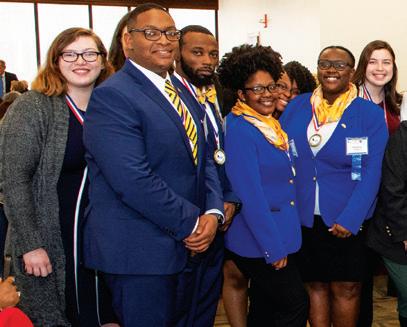From the President
The Answer Is a Question: Why? Nick Zomer
C
ountless sources offer tricks and tips to help teachers overcome the fatigue and struggles that come with our chosen profession, but we can each reignite our passion by answering one important question: “Why?” What is your why? Have you thought deeply about why you decided to become an educator? If not, I challenge you to think about this. Each of us has a why for entering into this profession. Go beyond the immediate reasons that may come to mind and think about how your experiences have helped shaped your “why.” Earlier this year, I had a most refreshing experience. My school held a teacherleader workshop for those interested in honing their skills as a leader inside and outside of the classroom. One session dealt with a seemingly simple but complex question: Why? Participants were asked to think about their why as an educator. Why did they enter this profession? Why do they come to work each day? Most of us did not enter into our noble profession to answer emails, grade the never-ending mountain of papers, or politely disagree with parents. We did not join for test prep purposes or to commit to memory our profession’s never-ending acronyms. Instead, we became teachers to foster a better tomorrow. One teacher’s story particularly inspired me. She relayed that her failed experience as an art major led her to the profession. (It should be noted that this individual is not our school’s art teacher; she is an English teacher.) For as long as she could remember, she
2 PAGE ONE
dreamed of becoming an artist, specifically an animator. Eagerly applying for college, ready to embark on her dream, she showed her portfolio to a university advisor who quickly dashed her dreams. Feeling at a loss, she reached out to a high school advisor seeking advice on where to go next. The advisor reminded her of her love of English literature, and challenged her to use this as a stepping stone towards a new opportunity. This teacher was able to take the dejection that she felt towards one possible pathway and has used it to help young students focus on their passion and not let anyone stand in their way. Soon after that session, I was joined in my office by one of my “frequent flyer” students. My stomach hit the floor when I heard what he had done. I was crushed knowing that someone who I had worked hard to support had made such a poor decision. As I counseled him, I found myself explaining my why to him. I told him that I did not become an administrator to fill out referral forms and hand out consequences. I told him that it was kids like him who inspired me to venture into administration. This role provided me with a unique opportunity to help him reach his goals, whatever they might be. I told him that students like him are my “why” as an administrator. My hope is that someday I might be able to help him see the bright future before him, if he stopped getting in his own way. Another teacher’s story has stuck with me as well. When you ask most educators about a teacher who particularly
inspired them, one or two typically jump to mind. But one of our teachers shared that, as a youth, he did not have such a person. He had teachers who he liked, but not one who had poured time and energy into him. After he held a series of unfulfilling jobs, he realized that something was missing. A period of reflection led him to realize that he wanted to be the kind of teacher that he never had. Looking at him now, that is exactly what he has become. He is an exceptionally strong advocate for true learning and growth among students. For him, success is not determined by a score on a test; it is completely based on the growth of the learners in his class. To him, his why is evident every time he interacts with a student. It’s not just about teaching the content — at which he is amazing; you sense his love and daily commitment to each student. That is his why. So now I ask you again — what is your why? Why do you do what you do? What inspires you to enter the schoolhouse every day? When the gray, dreary days follow you — remember your why. When you are feeling down, dejected, or at a loss — remember your why. When you’re celebrating, rejoicing over a student success, or having that proud teacher moment — remember your why. n As evidenced in our cover story on the staying power of veteran teachers, knowing your “why” is essential to remaining inspired in your classroom year after year. See article on page 6.
March/April 2020








